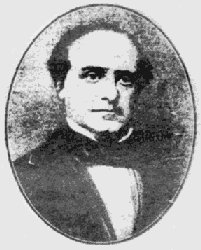Ernest Charles Jones facts for kids
Ernest Charles Jones (born January 25, 1819 – died January 26, 1869) was an English poet, a writer of stories (novelist), and a leader of the Chartist movement. He came from a wealthy family and became a lawyer. Jones is remembered as one of the most important Chartist leaders. He was also a friend of famous thinkers like Karl Marx and Friedrich Engels, and he helped start what we now call the modern Labour movement.
Contents
Early Life and Education
Ernest Charles Jones was born on January 25, 1819, in Berlin, which is now the capital of Germany. His parents were visiting the Prussian royal court there. His father, Charles Gustavus Jones, was a Major in the British Army. He worked for the Duke of Cumberland, who later became the King of Hanover.
In 1838, Jones moved to England. A few years later, in 1841, he published a romantic story called `The Wood-Spirit`. He also wrote some songs and poems. He studied law at the Middle Temple in London and became a lawyer on April 20, 1844.
Leading the Chartists
In 1845, Ernest Charles Jones joined the Chartist movement. This was a large movement in Britain where working-class people fought for more rights and a fairer society. Jones quickly became one of its most important leaders. He gave many speeches and wrote articles in newspapers to support the Chartist cause.
Jones was very passionate in his speeches. Because he spoke so strongly about changing the government, he was put in prison in 1848. He spent two years there. While he was in prison, he wrote a long poem called `The Revolt of Hindostan`. People say he wrote it using his own blood on pages torn from a prayer-book.
After he was released from prison, Jones continued his work for the Chartists. He ran a Chartist newspaper called `Notes to The People` from 1850 to 1852. He worked closely with his friend George Julian Harney to lead the "National Charter Association." Together, they helped the Chartist movement focus more on socialist ideas, which are about making society more equal for everyone.
When `Notes to The People` stopped publishing, Jones started another Chartist newspaper called the `People's Paper` in May 1852.
Friends with Marx and Engels
Ernest Charles Jones knew Karl Marx and Friedrich Engels personally. Marx and Engels were very interested in the Chartist movement and Jones's work. Marx even called Jones "the most talented, consistent and energetic representative of Chartism."
Marx also wrote articles for Jones's newspaper, `Notes to The People`. He contributed to articles about the French Revolution of 1848 and helped with many articles about economics. Jones was also strongly against imperialism, which is when one country takes control of another. His ideas influenced Marx's views on colonialism. For example, Jones spoke out against British rule in Ireland. He also wrote articles hoping that people in India would revolt against British control, which happened a few years later in the Indian Rebellion of 1857.
However, Jones was often the only main speaker for the National Charter Association. He didn't always agree with other Chartist leaders. Later, he joined the advanced Radical party, which also wanted big changes in society. Jones was also part of the Manchester section of the International Workingmen's Association, a group that brought together workers from different countries.
Later Life and Writings
After the main political movements calmed down, Ernest Charles Jones went back to being a lawyer. He also continued to write a lot. He wrote several stories, including `The Maid of Warsaw` and `Woman's Wrongs`. He also published more poems like `The Painter of Florence`, `The Battle Day` (1855), `The Revolt of Hindostan` (1857), and `Corayda` (1859). Some of his poems, such as `The Song of the Poor`, `The Song of the Day Labourers`, and `The Factory Slave`, became very well known. These poems often talked about the struggles of working people.
Death and Legacy
Ernest Charles Jones tried several times to become a Member of Parliament, but he was not successful. He was planning to run for election in Manchester, where he was very popular and likely would have won, but he sadly died in Ardwick, Manchester, in 1869. He is buried in Ardwick Cemetery.
Many people believe that Jones gave up a lot of money and a comfortable life because he refused to stop fighting for his Chartist beliefs. His wife was Jane Atherley. Their son, Llewellyn Atherley-Jones (1851–1929), also became a lawyer and a Member of Parliament for the Liberal Party.
Images for kids
 | Bessie Coleman |
 | Spann Watson |
 | Jill E. Brown |
 | Sherman W. White |



